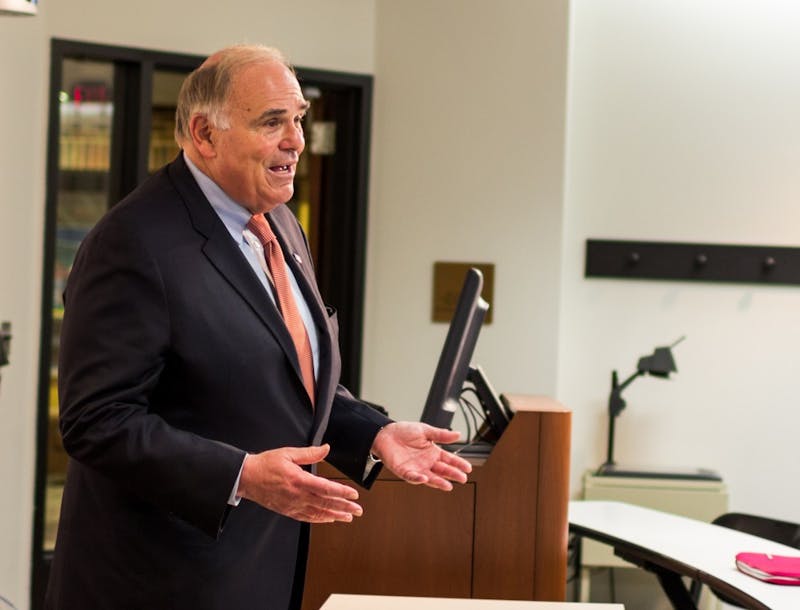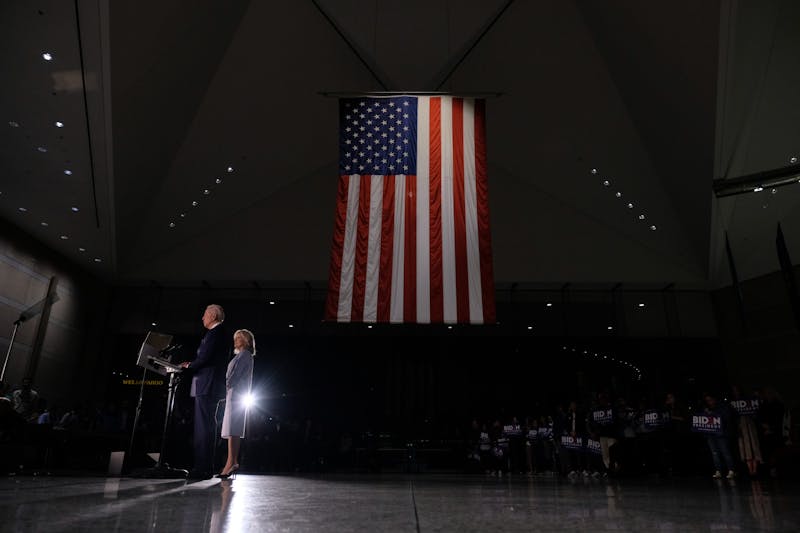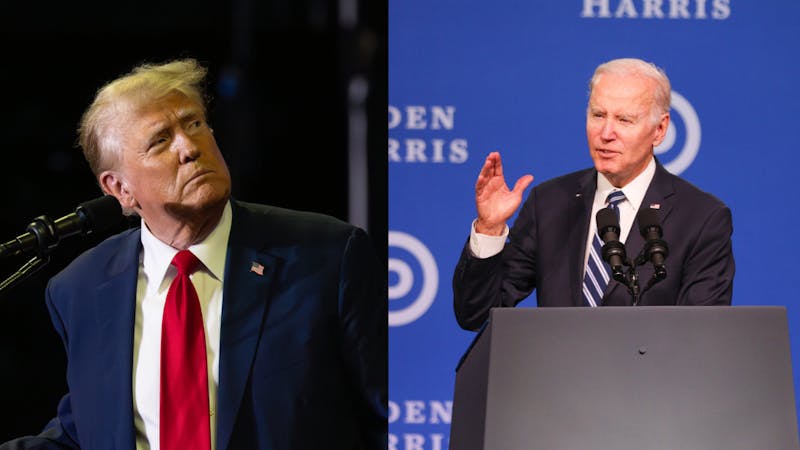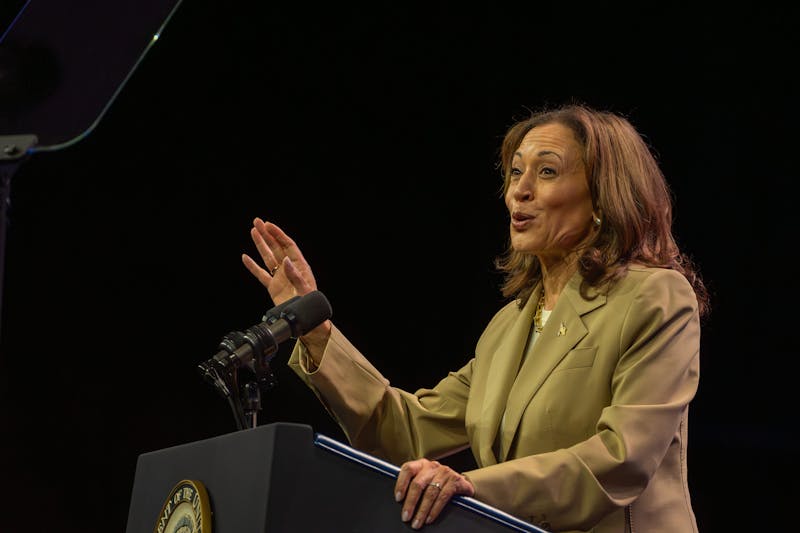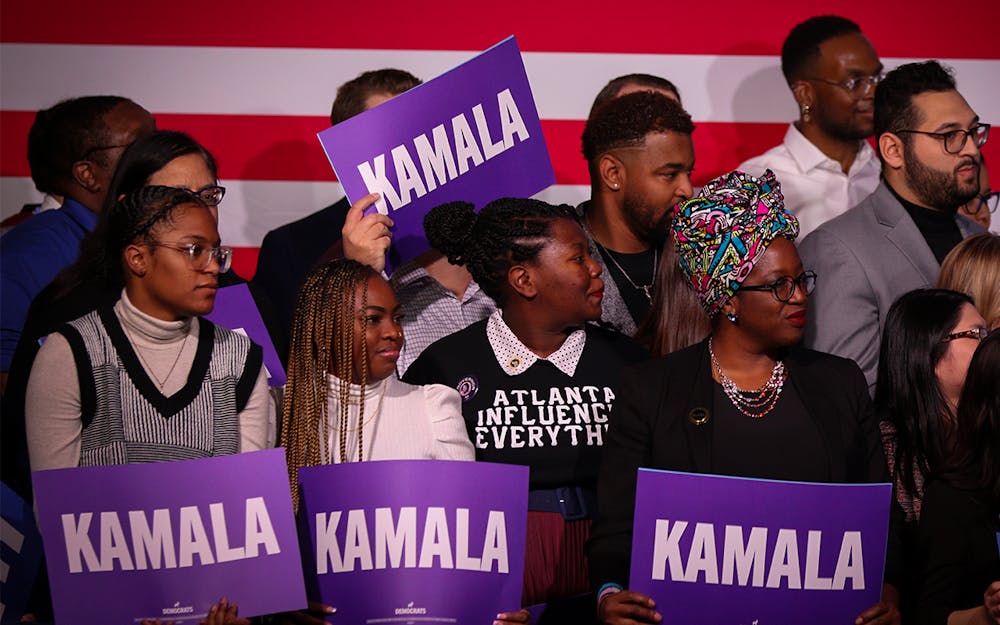
Penn faculty comment on the presumptive nomination of Kamala Harris following President Biden's decision to not run for a second term.
Credit: Abhiram JuvvadiWhen President and former Penn professor Joe Biden withdrew from the 2024 presidential race on Sunday and endorsed Vice President Kamala Harris to take the Democratic nomination in his place, he sparked a range of questions about the reasoning behind his decision and what the upcoming election might look like.
In the three weeks between his flawed debate performance on June 27 and his decision to withdraw on July 21, Biden publicly doubled down on his intent to run for reelection and made his decision to withdraw rapidly and privately — not even telling Harris until the morning of the announcement. Since then, Harris has received the support of enough Democratic delegates to secure the party’s nomination at the Democratic National Convention in August.
The Daily Pennsylvanian spoke with Penn faculty experts to gain insight into the factors that may have led to Biden’s unprecedented decision and what the start of Harris’ campaign might look like.
Stephen Pettigrew, the director of data sciences at the Penn Program on Opinion Research and Election Studies (PORES), believes “polling … really mattered” in Biden’s decision to concede the nomination, but also warned of the consequences of relying too heavily on numerical data.
“Polling is constantly getting better,” Pettigrew told the DP. “They’re working to improve the things that were problematic in the past. But we’ve seen 2016 be the biggest example of situations where polls ended up being wrong just enough to lead people to the wrong conclusion.”
He noted that most voters “already have a pretty well-established feeling” about which party’s candidate they will vote for in the presidential race and instead attributed significant changes in polling numbers to “a bad news cycle.”
“You kind of have to take those polls with a little bit of grain of salt, because until [Sunday], those were purely a hypothetical,” Pettigrew said. “Biden was still the likely nominee. When people are responding to polls about hypotheticals, they might be answering differently than they will now, if [Harris is] going to end up being sort of the presumptive person … We’re in a totally different political environment now that Biden is actually out, and it’s actually going to be somebody different.”
PORES Director of Operations Andrew Arenge agreed that polling was likely a factor in Biden’s decision and wrote in a statement to the DP that “shifting fundraising dollars [and] sentiment from elected officials” also likely factored into the president’s consideration.
He believes polling data will have a similar influence on who Harris picks as her running mate.
“While a lot of folks in the Democratic party are getting behind Harris in this moment, in the coming days, we might see some cracks in that support,” Arenge wrote. “The campaign will pay close attention to which subgroup of voters are more excited by Harris’ candidacy and which voters are less excited about this prospect and try to use the vice presidential pick as a way to reassure these voters about the ticket.”
Arenge, who analyzes political advertising data trends, will continue to monitor where the Harris campaign allocates its advertising dollars as November approaches.
“One thing I’ll be keeping a close eye on is how the geographic targeting changes after a new Democratic nominee is selected,” Arenge wrote. “The Biden campaign really narrowed in on running digital ads in Scranton, PA - Biden’s hometown. With a different candidate on top of the ticket, it will be interesting to see how the specific geographic targeting shifts.”
Dick Polman, a “writer in residence” at the Department of English and longtime political journalist who teaches journalism at Penn, wrote to the DP that he expects Harris to receive much of the media’s attention in the coming weeks and added that the media “contributed” to amplifying voters’ concerns about Biden’s ability to win.
“The best coverage merely amplified what was already happening on the ground,” he wrote. “Biden’s growing political woes were mostly powered by grassroots Democratic concerns that he couldn’t win.”
Political science professor Marc Meredith added that, despite similarities to the 1968 presidential election in which an incumbent president stepped down from a reelection campaign and a candidate was assassinated, he does not believe “we’ve ever experienced anything like this.”
He said that surprises may still arise moving forward, but believes that Biden’s quick endorsement of Harris who was “on the ballot when people were voting in the primary” makes matters less uncertain.
Following Harris’ selection of a running mate, Meredith predicts that the election will “move forward much like every other election.”
Penn’s Vice Provost for Global Initiatives Ezekiel Emanuel — who served on Biden’s Transition COVID-19 Advisory Board — wrote to the DP that it became “abundantly clear that President Biden didn’t have the ability to run for re-election” over the past few weeks.
“He put country over his own political ambitions, and for that, I am very thankful,” Emanuel added.
The Daily Pennsylvanian is an independent, student-run newspaper. Please consider making a donation to support the coverage that shapes the University. Your generosity ensures a future of strong journalism at Penn.
Donate







